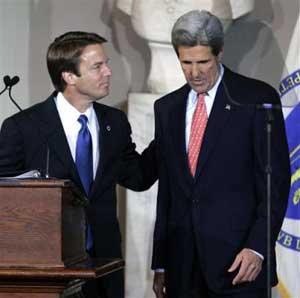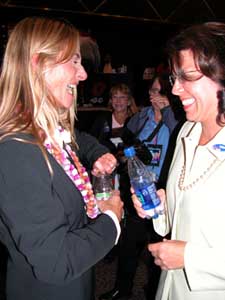-
- Conservatives vow lengthy P&G boycott over gay rights
- McGreevey order creates needle-exchange programs in New Jersey cities
- ‘Uncensored’ website stirs up Idaho high school newspaper
- Cipel says McGreevey harassment was ‘continuous nightmare’
- Medical marijuana advocates press feds
- Troubled SoCal religious network cancels live ‘Praise-a-thons’
- National News Briefs
- World News Briefs
feature
FOUR more YEARS?!
Digesting this year’s election
Published Thursday, 04-Nov-2004 in issue 880
And the winner is…
In the end, as the pundits had predicted, it all came down to Ohio. At 11:00 a.m. EST on Wednesday, Nov. 3, Senator John Kerry, D-Mass., called President George W. Bush to concede Ohio’s 20 electoral votes and, therefore, the election. As the Gay & Lesbian Times went to press, the Bush camp claimed 274 electoral votes – four more than the 270 needed – with Wisconsin, Iowa and New Mexico still too close to call. In contrast to 2000, Bush also won the popular vote, capturing 51 percent.
As expected, the Republicans retained control of the House of Representatives and, at press time, it appeared that the party was poised to expand its 51-vote majority in the U.S. Senate by four or five seats. In the night’s most dramatic upset, Senate Minority Leader Tom Daschle lost his seat to Republican Congressmember John Thune by 4,530 votes. In California, Senator Barbara Boxer easily beat her Republican opponent, former Secretary of State Bill Jones, by a margin of 58 to 38 percent.
At press time, write-in mayoral candidate Councilmember Donna Frye held a slim 4,200-vote lead over incumbent Mayor Dick Murphy, with as many as 130,000 provisional and absentee ballots still to be counted. County Supervisor Ron Roberts was a distant third. San Diego voters also passed Proposition F, the so-called strong mayor initiative. If Frye’s lead holds, she would become the city’s first “strong mayor,” an ironic twist, since she was the only one of the three candidates to oppose the proposition.
In other local races, Assemblymember Christine Kehoe trounced her Republican challenger, Larry Stirling, to move into the 39th State Senate seat, and Democrat Lori Saldaña beat Republican Tricia Hunter for the 76th Assembly seat Kehoe vacated due to term limits. As of Wednesday, Chula Vista Councilmember Patty Davis lost (unofficially) to Republican incumbent Shirley Horton by some 1,600 votes.
Though not on the ballot, Governor Arnold Schwarzenegger was also a big winner Tuesday, as California voters approved all but one of the state initiatives he supported and defeated all he opposed. In particular, voters overwhelmingly approved Proposition 71, which will issue $6 billion in state bonds to fund basic stem cell research.
On the national level, voters in 11 states approved constitutional bans on same-sex marriage. Margins of victory ranged from 86 percent in Mississippi to roughly 57 percent in Oregon.
Karl Rove, same-sex marriage and the ‘homosexual agenda’
To the roughly 50 percent of Americans who appear to loathe George W. Bush, his promise in the 2000 election to be a “uniter not a divider” was the first of his many deceptions. Instead, they argue, the man who lost the popular vote that year and won the electoral vote due to a Supreme Court ruling, has governed as if he won the election by a landslide against opponents who were sinful and unpatriotic.
Most observers attribute this tactic to the president’s key political advisor – some would say his Svengali – Karl Rove. In a recent op-ed article in the Los Angeles Times, Neal Gabler of University of Southern California’s Annenberg School of Communications called Rove “America’s mullah,” and suggested that what he called “Rovism” is perverting American values by putting policy in the service of politics.
Rovism has three central tenants: the end, i.e., victory always justifies the means; criticizing the president for any reason is unpatriotic; and the president should never admit to a mistake because by definition he never makes any. Gabler contents that Rove has directed a cynical four-year campaign to make Bush a “divider not a uniter.”
“No recent administration has as eagerly played the wedge issues – same-sex marriage, abortion, stem cell research, faith-based initiatives – to keep the nation roiling in the pure Rovian belief that the president’s conservative supporters will always be angrier and more energized than his opponent’s,” Gabler wrote. “Division, then, is not a side effect of policy; in Rovism, it is the purpose of policy.”
No wedge issue was more useful to Rove in this year’s election than the incendiary subject of same-sex marriage. Rove had long believed that Bush nearly lost the 2000 election due to lower-than-expected turnout among evangelical Christians. Determined to fix the problem this time around, Rove convinced Bush to demonize gays, abortionists and liberals in order to increase evangelical turnout. Thus the Bush administration played the antigay card early and often, but for a long time, most of their efforts were largely under the radar screen. Attorney General John Ashcroft attempted to stop an organization of gay lawyers in the Justice Department from meeting on federal property, but later backed down. Press reports surfaced that some of the “Christians” Bush appointed to various advisory panels on AIDS referred openly to the gays on the panel as “freaks.”
In one infamous incident, Rove tried to cut a deal with the Salvation Army to support Bush’s doomed “faith-based initiative” in exchange for a provision exempting the organization and others like it from local laws banning GLBT discrimination. When the Washington Post broke the story in May of 2001, everybody involved quickly backed off, and the hapless Salvation Army hired a public relations firm to contain the damage. To Rove, the fact that this proposal ignored the Republican Party’s longstanding commitment to states’ rights was irrelevant. It passed the only test that really mattered – it was politically expedient.
Then came June 27, 2003, the day the world changed forever for the American gay-rights movement. On that Thursday morning, the Supreme Court issued its ruling in Lawrence v. Texas, voting 6-3 to overturn the state’s infamous Homosexual Conduct Law. It had all begun on a warm September night in 1998 when two Houston police officers entered the unlocked apartment of John G. Lawrence and found him having sex with Tyron Garner. (They were responding to a report of a “weapons disturbance” from a neighbor, who was later convicted of filing a false report.) The cops arrested Lawrence and Garner and charged them with violating the Texas anti-sodomy law. The law banned “deviant sexual intercourse,” conveniently defined as oral or anal intercourse between two people of the same sex. Heterosexuals were exempt.
Lawrence and Garner spent the night in jail and paid a fine of $200 each. Most importantly, they pled no contest to the charges, thus preserving their right to appeal. To no one’s surprise, the Texas state courts dismissed their challenge to the law, and the United States Supreme Court accepted the case on appeal. The Supreme Court heard oral arguments – literally and figuratively – in the case on March 16 of last year, and issued its landmark ruling on June 27.
Usually the Supreme Court answers the questions it’s asked in the narrowest possible terms. Not this time. As New York Times reporter Linda Greenhouse wrote: “The Supreme Court issued a sweeping declaration of liberty for gay men and lesbians today, overruling a Texas sodomy law in the broadest possible terms and effectively apologizing for a 1986 decision that the majority said ‘demeans the lives of homosexual persons.’”
Writing for the majority, Justice Anthony Kennedy, a Reagan appointee and former federal judge in Sacramento, said that the state cannot “demean the existence” of gays and lesbians by “making their private sexual conduct a crime.” Furthermore, he said “adults may choose to enter upon this relationship in the confines of their own home and in their own private lives and still retain their dignity as free persons.”
The scope of the ruling stunned everybody involved. The attorney for Pat Robertson, whose life’s work was demeaning the existence of gays and lesbians, called it “a grand-slam homer for the other side.” Jerry Falwell moaned “it was as bad a day the court has had on social issues since Roe v. Wade.” Ruth Harlow, head of Lambda Legal Defense Fund and lead counsel for Lawrence and Garner, called the decision “historic and transformative.” The president of the United States said nothing.
Rove sensed an opportunity. Watching the faux Christians of the “religious” right freaking out all around him, he realized that gay bashing had just become a far more potent technique to get out the “Christian” vote for Bush in 2004. And he had the perfect issue to terrify them: same-sex marriage.
Yesterday, voters in 11 states from Oregon to Mississippi voted on constitutional amendments to ban various forms of same-sex marriage. All passed easily. Most are redundant. Some of their provisions will be tied up in the courts for years. But the dirty little secret is that Karl Rove doesn’t care about same-sex marriage at all. Using surrogates like Robertson and Falwell, Rove and his henchmen put those issues on the ballot for one reason only: to turn out the right wing “Christian” vote for George W. Bush. And it appears to have worked – in the short run.
Hypocrisy on the Hill
The Republicans’ homophobia would be a bit easier to take if it were sincere. Too often, however, it’s merely a campaign tactic. Like most knowledge-based regional economies, Washington, D.C., is crammed with gays. Where do they work? The same places other people in Washington work, including the offices of Republican members of Congress and, amazingly enough, at the highest levels of the Republican National Committee. Many are in the closet, and many aren’t. While they probably don’t talk about it with the politicians they work for, their bosses know they’re gay and generally don’t care as long as they get the job done.
Take Jay Banning, chief financial officer and director of administration for the Republican National Committee. He’s gay. So is his colleague Daniel Gurley, the party’s national field director and deputy director of operations. Two months ago, D.C. activist Michael Rogers outed them both on his must-read website, Blogactive.com. Rogers used a most ingenious technique to confirm this information. He called them up and asked them. Without hesitation they both said yes. In a follow-up story in its Oct. 15 issue, the Washington Blade asked Gurley if the two had faced any problems in the workplace since they were outed. “The reaction with Jay, at least to my knowledge, has been the same as it’s been with me,” Gurley said. “Everybody’s been completely supportive of us.”
Isn’t that heartwarming? But as Rogers points out, isn’t this the same Republican National Committee that sent mailers to evangelical Christians in Arkansas and West Virginia claiming that “liberal politicians” are trying to ban the Bible while promoting same-sex marriage? Isn’t this the same Republican Party whose platform calls for a constitutional amendment to ban same-sex marriage and a plank that vehemently opposes all laws banning workplace discrimination based on sexual orientation?
Isn’t this also hypocrisy on a breathtaking scale? Of course it is, but remember the first rule of Rovism: the end – winning – always justifies the means. Getting those “Christians” to the polls yesterday was all that mattered.
Here’s another bizarre twist: A highly-placed Democratic staffer on Capitol Hill told the Gay & Lesbian Times that it’s her impression, shared by some of her colleagues, that more gay men work for Republicans in Congress than for Democrats. “We’ve never quite figured that one out,” she said.
This little demographic tidbit, if accurate, may pose more questions for psychiatry than journalism, but the hypocrisy of Senator Elizabeth Dole, R-N.C., would seem to lend it credence. Michael Rogers is making a lot of gay Republicans very, very nervous. He’s outing Republican staffers right and left in one of the last places in western civilization where the love-that-dare-not-speak-its-name hasn’t. According to press reports, Senator Dole took great pains to assure her staff that they need not worry about being outed. All that matters to her, she supposedly said, is that they do their jobs well. Two weeks later, Dole served as her party’s point person on same-sex marriage at the Republican National Convention in New York. Her primetime speech was a litany of the evils of same-sex marriage, complete with attacks on the “activist judges” who made it possible.
The bottom line is this: Many Republican politicians say one thing and do quite another on gay rights issues. To them, bashing gays is a political tactic, not a core belief. These people aren’t stupid. They know their buddies Pat Robertson and Jerry Falwell are Looney Tunes. But they’re loonies with television shows and lots of fearful followers – people who can be frightened to the polls by breathless warnings about the evils of the “homosexual agenda.”
A look ahead: Where do we go from here?
Same-sex marriage may have taken a pounding at the polls on Tuesday, but Matt Foreman, executive director of the National Gay and Lesbian Task Force (NGLTF), sees some hopeful signs as well. Foreman reminded reporters Wednesday morning that nationwide polls “consistently show that 64 percent of Americans favor either civil unions or marriage for gays and lesbians.” While the phrase “same-sex marriage” may be toxic, the concept of fairness isn’t. When you break down the concept of marriage into its components – healthcare, inheritance rights and so forth – most people don’t seem to have a problem with it. “If we are able to talk to voters as to why marriage matters,” Foreman said, “we can win them over.”
But talking takes money. Foreman says Oregon was the only state where amendment opponents raised anything close to the amount of money the antigay movement had to spend. “It’s no coincidence that it’s also the state where we came closest to victory,” he said. “We focused most of our efforts in Multinomah County, where Portland is,” he added, “and 60 percent of the people there voted against it.”
Foreman cites other positive signs as well, including the successful effort in Cincinnati to repeal Article XII of the city charter, which prohibited the city council from passing any gay-rights legislation whatsoever. The business community spearheaded the repeal drive there, arguing that, in addition losing revenue from conventions that would no longer come there, the city’s businesses were having trouble attracting the “young knowledge workers” so critical to the future of the economy. People – straight and gay – don’t want to move to or start a business in a town that seems so intolerant. Foreman says the gay rights movement also forged new allies in the heat of 11 simultaneous anti-amendment battles, including the United Auto Workers Union and the AFL-CIO of Michigan, both of which opposed that state’s amendment. “Members of our community built relationships that will benefit us in the future,” Foreman said.
Other observers cited President Bush’s recent statement to Charlie Gibson of “Good Morning America” that states should have the right to establish civil unions as a sign that Republicans might become more tolerant. Don’t count on it, Sean Cahill, director of NGLTF’s policy center, told the Gay & Lesbian Times. Cahill, author of the recently published book Same-Sex Marriage in the United States: Focus on the Facts, sees Bush’s statement as little more than a last-minute campaign tactic to make him more appealing to moderate voters. “He’s had four different positions on the subject during the past 12 months,” Cahill said, noting that the Republican platform, adopted just two months ago, commits the party to stridently oppose any kind of gay-rights legislation whatsoever.
“In the end,” Foreman said, “it all comes back to the Constitution. We’re confident that, just as the Bill of Rights has assured so many American freedoms over the years, it will ultimately assure gays and lesbians the right to marry.”
Translation: No matter what happened last Tuesday, it’s still our country too.
|
|
Copyright © 2003-2025 Uptown Publications




